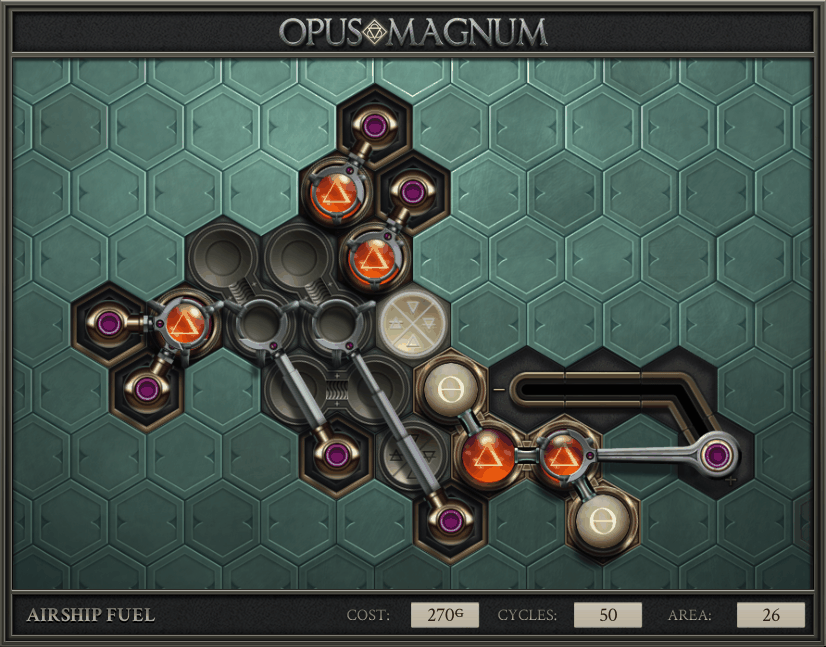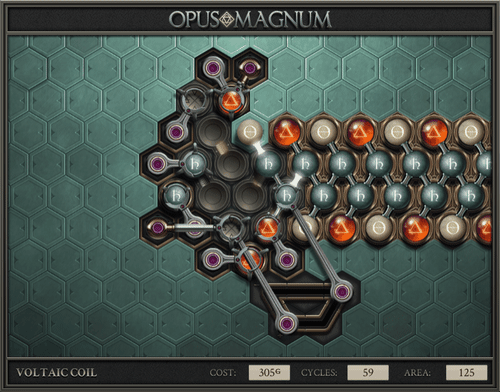Opus Magnum: Another Zachtronics Masterpiece
10 Dec 2017 Developer: Zachtronics
Developer: ZachtronicsPublisher: Zachtronics
Platform: PC (Reviewed)
Released: Oct 19, 2017
Copy Purchased
If you have played a Zachtronics game, in my opinion, Opus Magnum one of their best games. For those of you have not played a Zachtronics game, in the simplest terms, they make programming games. That might sound boring to you, but if you like puzzle games I suggest that you give programming games a chance. For most puzzle games the goal is to clear the level in the least amount of moves. In programming games the goal is to clear the level in the least amount of instructions. However just telling the player to write code is boring and for some hits too close to home to be considered enjoyable. To alleviate this, Zachtronics always has a theme to tie and abstract the core gameplay. In Opus Magnum you play an alchemist / engineer who creates fantastical contraptions to create vital remedies, precious gemstones, deadly weapons, much more.
The first comparison most people will make is to Zachtronics first game, Spacechem. In Spacechem you combine elements in a programmatic manor, in Opus Magnum you combine elements in a programmatic manor. However, if you played Spacechem and Opus Magnum the two games are nothing alike other than their theming and game genre are the same. One of the first things that set Opus Magnum apart is the theme of the game. You play an alchemist / engineer whose goal is to create a contraption to sell to a client. As when you are selling anything three major factors come into play, cost, speed, and size. Thus in Opus Magnum it is up to you the player to determine your metric on which to measure success. You can create a contraption that might be super cheap but might be bulky and slow, or you might produce a product that is super quick but big and expensive. If you are truly a masochist you will try to minimize all three aspects and create the best product possible. Allowing the player to define success is a smart move as different players will have different measures of success. Without an average to judge yourself, these metrics mean nothing. Luckily, Zachtronics has you covered with player averages in all three fields if you are connected to the internet. This in my opinion is what makes Opus Magnum great, these metrics push myself to make the best machine possible and wonder how people are able to create better solutions. If you want to show off your solution the game even includes a gif making functionality built into the game, allowing you to create satisfying images of your solutions to show off to your friends.

The game does a good job of teaching you the basics of how to play the game without handholding you. The games length will depend on how long it takes you to solve a puzzle and how much time you want to put into perfecting your solution. The game has six subsections with their own theming and story to unravel with multiple puzzles in each section. The game also has integrated steam workshop so that users can submit their own puzzles for others to play. If you make a really good puzzle Zachtronics will put it front in center in a curated section. The game also has a mini game to distract you from just how terrible your solution is. However, I skipped this mini game as it is not required and was completely different than the core gameplay I desperately craved. I would highly recommend this game to people who like programming and anyone interested in puzzle games. Zachtonics delivers once again on a game genre that is becoming synonymous with them.
Buy the game on Steam